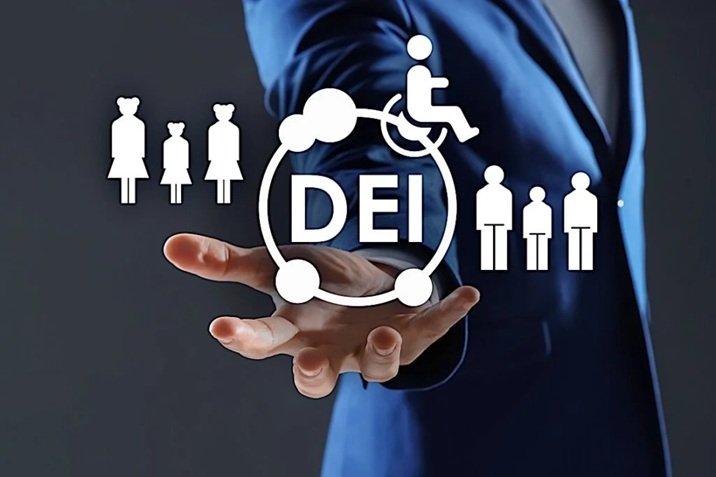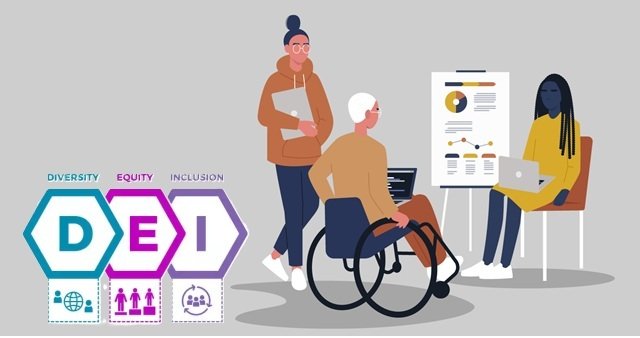Introduction
What is DEI in HR: In today’s current place of job, businesses are focusing greater on creating inclusive environments in which each employee feels valued and revered. This is wherein DEI (Diversity, Equity, and Inclusion) in HR performs an essential position. But what exactly is DEI in H.R, and why is it essential?
Diversity, Equity, and Inclusion (DEI) refers to the regulations and practices that ensure honest treatment, get right of entry, opportunity, and advancement for all employees, no matter their heritage, gender, race, or different traits. HR departments play a vital function in enforcing DEI strategies to sell a greater inclusive painting tradition.
This article explores what DEI in H.R means, why it matters, and the way organizations can enforce DEI correctly.
What is DEI in H.R?
DEI in HR stands for Diversity, Equity, and Inclusion in Human Resources. It is a framework used by organizations to make sure that personnel from numerous backgrounds experience welcomed, valued, and empowered inside the place of work. Let’s smash it down further:
1. Diversity
Diversity refers to the differences amongst employees in phrases of race, gender, age, ethnicity, incapacity, sexual orientation, socioeconomic heritage, education, and enjoyment. A diverse place of job benefits from multiple views, leading to innovation and higher selection-making.
2. Equity
Equity guarantees that every one employees acquire fair treatment, possibilities, and resources to prevail. It acknowledges that distinct employees have specific wishes and addresses the ones gaps by way of presenting important guide.
3. Inclusion
Inclusion is set to grow a way of life where every worker feels respected, heard, and valued. It means ensuring that numerous voices are not simply present but additionally covered in choice-making methods.
Why is DEI Important in HR?
1. Increases Employee Engagement
When employees experience blanketed and valued, they are extra engaged and encouraged to make contributions definitely to the corporation.
2. Attracts and Retains Talent
A sturdy DEI method makes an organization more attractive to top talent. Employees are more likely to live in offices in which they feel reputable and feature identical boom opportunities.
3. Enhances Innovation and Creativity
Diverse groups bring a couple of perspectives, leading to better hassle-fixing and innovative thoughts. This gives corporations a competitive aspect in the marketplace.
4. Improves Company Reputation
Organizations recognized for their range and inclusion efforts are more likely to have a sturdy enterprise logo, attracting customers and companions who price social duty.
5. Reduces Workplace Conflicts
A properly dependent DEI policy can assist minimize discrimination, biases, and conflicts, main to an extra harmonious and efficient place of business.
How HR Can Implement DEI in the Workplace

1. Develop a DEI Policy
HR needs to create a clear DEI policy that outlines the organization’s commitment to diversity, equity, and inclusion. This policy needs to cover hiring practices, administrative centre behaviour, and strategies for addressing discrimination.
2. Train Employees on DEI
DEI schooling packages assist personnel in recognizing subconscious biases and a way to create an inclusive painting environment. Training periods have to be obligatory for all personnel, which include managers and bosses.
3. Use Inclusive Hiring Practices
HR should implement blind resume screening, numerous interview panels, and bias-free process descriptions to make certain fair hiring. This ensures that hiring choices are based totally on talents and revel in rather than biases.
4. Create Employee Resource Groups (ERGs)
ERGs are worker-led groups that provide aid, networking, and advocacy for numerous personnel. Examples encompass agencies for women in management, LGBTQ+ personnel, and racial minorities.
5. Promote Pay Equity
HR needs to often audit salaries to discover any gender or racial pay gaps and take essential steps to make sure the same pay for equal work.
6. Encourage Inclusive Leadership
Managers and bosses ought to learn to lead inclusively by taking note of numerous perspectives and growing opportunities for underrepresented personnel.
7. Gather Employee Feedback
HR needs to conduct everyday surveys to recognize employees’ reports with DEI tasks and make improvements based totally on their comments.
Common Challenges in Implementing D.EI in HR
While DEI efforts have many advantages, organizations regularly face challenges while seeking to implement them. Some of these demanding situations encompass:
1. Resistance to Change
Some personnel or leaders might also withstand DEI projects, viewing them as useless or disruptive. Effective conversation and leadership assistance are crucial to conquering this resistance.
2. Unconscious Bias
Even with excellent intentions, subconscious bias can affect hiring selections, promotions, and workplace interactions. Regular bias education is essential to limit its effects.
3. Measuring DEI Success
It may be difficult to measure the effect of D.EI tasks. Companies need to set clear KPIs (Key Performance Indicators) along with employee pride, range in leadership roles, and retention charges.
4. Lack of Diverse Leadership
Many companies work with a lack of variety in management positions. Companies need to be aware of growing mentorship and management applications for underrepresented employees.
5. Limited Budget for DEI Programs
Some groups, particularly smaller corporations, may additionally lack the financial resources to put into effect comprehensive DEI packages. However, even low-cost tasks like mentorship applications and employee dialogue forums can make a massive distinction.
Examples of Companies with Strong DEI Programs

Many global corporations have successfully applied DE.I projects. Here are a few examples:
1. Google
Google has a robust DEI application that consists of subconscious bias education, pay equity audits, and employee useful resource agencies to guide various employees.
2. Microsoft
Microsoft specializes in hiring numerous talent and providing leadership improvement packages for underrepresented organizations.
3. Salesforce
Salesforce has a dedicated Chief Equality Officer and runs programs like same-pay tests and mentorship projects for girls and minorities.
Future of DEI in HR
As offices keep conforming, DE.I will continue to be a top precedence for HR teams. The destiny of DE.I in HR may additionally consist of:
1. AI-Powered DEI Initiatives
Companies are increasingly using AI gear to eliminate hiring biases and examine teams of workers a variety of information.
2. Focus on Neurodiversity
More companies are recognizing the fee of neurodivergent personnel (which includes people with autism, ADHD, or dyslexia) and developing inclusive painting environments for them.
3. Hybrid and Remote Work Inclusion
With extra employees running remotely, HR groups have to make sure that far-flung personnel experience is covered and features identical opportunities for increase.
4. Stronger DEI Policies and Regulations
Governments and businesses are enforcing stricter D.EI guidelines to make certain places of business equity and accountability.
Conclusion
DEI in HR isn’t only a fashion; it’s a necessity for constructing a strong, inclusive, and hit workplace. By specializing in Diversity, Equity, and Inclusion, groups can entice top talent, improve worker engagement, and pressure innovation.
HR specialists play a vital function in implementing D.EI strategies that make certain truthful possibilities for all employees. While there are challenges, groups that prioritize D.EI will create greater inclusive and forward-wondering workplaces for the destiny.
FAQs approximately D.EI in H.R
1. What does DEI stand for in HR?
DEI stands for Diversity, Equity, and Inclusion in Human Resources. It specializes in developing an honest and inclusive administrative centre for all employees.
2. Why is DEI crucial inside the place of job?
DEI helps businesses appeal to pinnacle expertise, increase innovation, enhance employee engagement, and decrease administrative centre conflicts.
3. How can HR promote DEI?
HR can promote DEI by enforcing inclusive hiring practices, pay fairness regulations, D.EI schooling programs, and worker resource groups.
4. What are a few common D.EI-demanding situations?
Common demanding situations consist of resistance to alternatives, subconscious bias, loss of leadership, and difficulty in measuring achievement.
5. How can group degree D.EI achievement?
Companies can song diversity in management, employee pleasure surveys, hiring statistics, and retention rates to degree D.EI achievement.
Disclaimer:
The information provided in this article is for educational and informational purposes only. It does not constitute legal, financial, or professional HR advice. Organizations should consult with HR professionals or legal experts before implementing D.EI policies.
Read More:-













Leave a Reply